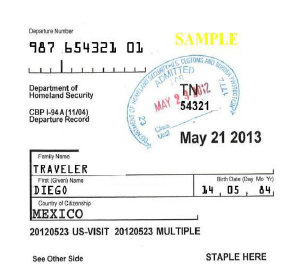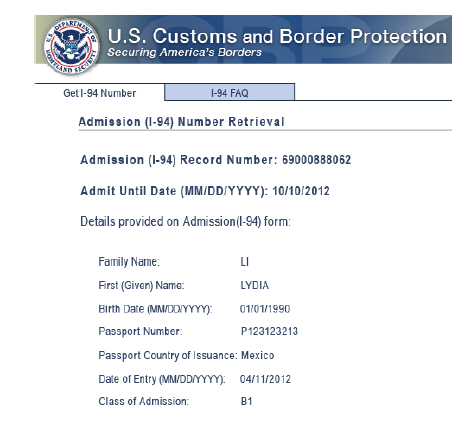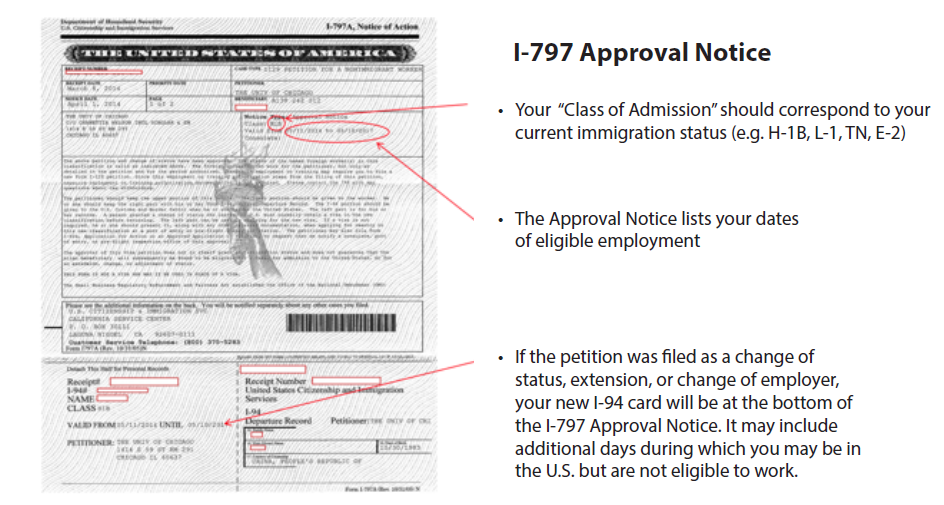The I-94 record, which determines the validity of a nonimmigrant’s status, often presents challenges that are not expected by the foreign national or their employer. Unfortunately, the failure to be aware of the validity period of the I-94 can cause all sorts of serious problems. For example, some of the consequences can be:
- The accrual of unlawful presence due to an overstay, which can trigger bars to admission in the future to the United States (U.S.);
- The voidance of a visa due to an overstay;
- Unauthorized employment;
- The inability to change or extend status in the U.S. due to an overstay;
- The inability to qualify for adjustment of status in the U.S.; and/or
- The denial of a nonimmigrant visa at a U.S. consular post due to concerns that the applicant will not comply with the terms of their nonimmigrant visa, if issued.
It is critical to remember that an overstay (staying longer in the U.S. than specified on the I-94 record) can result in the voidance of the visa linked to the I-94 as well as the accrual of unlawful presence in the U.S. A departure from the U.S. (even to Canada or Mexico) post 180 days of unlawful presence after the expiration date of the I-94 can subject the individual to a ground of illegal presence inadmissibility to the U.S. for three years.[1]
Who issues this I-94 admission record?
U.S. Customs and Border Protection (CBP) officers typically issue an I-94 record upon initial admission to the U.S. electronically and sometimes still via paper. On subsequent admissions during the validity period of that initial I-94, they might revalidate the same I-94 record or issue a new one. Canadians, who are visa-exempt in most nonimmigrant categories, are sometimes advised to ask for an I-94 admission record from CBP. The I-94 record, along with a travel history, is normally available here . It is important to check these records upon each admission for accuracy. In addition, the CBP travel history online does not reflect the U.S. Citizenship and Immigration Services (USCIS) issued I-94, which is noted below on an I-797A[2] approval notice.
USCIS also issues an I-94 record at the bottom of I-797A approval notices for a change or extension of nonimmigrant status. For some nonimmigrant categories like the E-1, E-2, E-3, H-1B, L-1, O, P, and TN, for example, the I-94 approval validity period in the upper right-hand corner of the I-797A will indicate a period for work authorization, but the I-94 at the bottom of the I-797A may add ten days by regulation, which allows the nonimmigrant to remain in the U.S. without work authorization but maintaining status. [3]
I-94 CBP examples:


I-797A USCIS I-94 Example (DO NOT REMOVE THE I-94 from the approval notice as stated. Keep a scan of the whole I-797A for status reference with your passport.)

How can being from a country not on the Six Month Club list for passport validity affect the I-94 period of admission?
For admission to the U.S., in contrast with visa applications before a consular officer abroad of the Department of State, CBP officers at the port of entry are required to limit an I-94 admission record to the date within six months of a passport’s expiration when the visa holder is not from a country on the Six Month list.[4] The applicable regulation states that the “passport of an alien applying for admission must be valid for a minimum of six months from the expiration of the contemplated period of stay,…”[5] Some countries have agreements or arrangements with the U.S., which allow their passports to be recognized as valid for return to their country of nationality for six months beyond the expiration date specified in the passport. The effect of these agreements or arrangements is to extend the validity of the passport for six months beyond the expiration date appearing on the face of the document[6].
As an example of how the Six Month Club can mess up your authorized approval from USCIS, let’s consider the initial H-1B approved nonimmigrant for change of status from F-1 student status for the typical three years. The I-797A approval notice will note a three year period of work. An H-1B nonimmigrant returning to the U.S. on a newly issued visa from a consulate in China may be issued an H-1B visa for one year based on the reciprocity schedule at present [7]. Even though the visa is limited to one year, the I-797A approval notice allows a CBP officer to admit the H-1B visa holder for the three year period specified on the notice. What if the Chinese H-1B nonimmigrant’s passport though expires in 6 months of the application for entry to the U.S.? China is not a member of the Six Month Club, so CBP basically looks at the passport as valid for admissions to the U.S. for a date six months “before” the expiration date of the passport. So, now the Chinese H-1B visa holder has an I-94 admission record online with an expiration date in six months potentially. After entry to the U.S., this limited I-94 record is not a CBP “mistake” for correction at a deferred inspections location, for example. The usual fix is an extension application filed with USCIS to recognize the original I-797A approval period. This situation is not a fact pattern anyone wants to have to address. Mistakes do happen in the application of this rule and sometimes they are to the benefit of the nonimmigrant. The moral of story is to know about the Six Month Club and check passport longevity always before an admission request to the U.S.
What about grace periods?
Of course, there are other grace periods allowing the nonimmigrant (e.g., E–1, E–2, E–3, H–1B, H–1B1, L–1, O–1 or TN classification and their dependents) to remain in the U.S. after termination of employment for up to 60 days or the validity period of the I-94, whichever is shorter. [8] In addition, a timely filed extension application before the expiration of an I-94 for a work-authorized nonimmigrant, assuming the nonimmigrant still has time remaining for the nonimmigrant category, can extend work authorization as authorized for the sponsoring employer automatically in the U.S. for up to 240 days or the adjudication of the application, whichever is earlier.[9]
What is this issue about Petition Expiration Dates (PED) on a visa?
In some cases, a nonimmigrant visa can be issued under the applicable reciprocity schedule for a longer period than the maximum period of admission allowed for the category by regulation. For example, an applicant for a blanket L visa at the U.S. Consulate or Embassy might be eligible for a five-year visa under the reciprocity schedule, but a grant of admission is limited to three years under the regulations. Thus, the visa foil and the I-129S certificate of eligibility stamped by the consular officer will be annotated with a PED validity period of three years, and the I-94 admission record will be limited to three years. TN and E visa holders may be admitted (issued an I-94) for up to three years and two years, respectively, based on the regulations up to the expiration of the visa’s validity.
Takeaway
It’s essential to take the I-94 form seriously, in all its variations issued by USCIS or CBP, ensuring thorough checks of its validity period and admission category. Beware of relying solely on an I-797A USCIS I-94 record after subsequent admission by CBP at a port of entry; the CBP record supersedes, reflecting the most recent authorized admission period.
Related Services:
About the Author:
 Kathleen Campbell Walker is chair of the Immigration Practice Group, based in El Paso, Texas. She is a past president (2007) and general counsel (2009) of the American Immigration Lawyers Association (AILA). She began practicing immigration law in 1986. In 2014, Ms. Walker received the AILA Founder’s Award, given occasionally to the person or entity having the most substantial impact on immigration law or policy. She is board certified in Immigration and Nationality Law by the Texas Board of Legal Specialization. In addition, she is recognized in Chambers USA (Band One), Chambers Global (Band One), International Who’s Who of Business Lawyers, Super Lawyers, and Best Lawyers in America. She is rated AV® Preeminent™ in Martindale-Hubbell®. She can be reached at 915-541-9360 or kwalker@dickinsonwright.com, and her biography can be accessed here.
Kathleen Campbell Walker is chair of the Immigration Practice Group, based in El Paso, Texas. She is a past president (2007) and general counsel (2009) of the American Immigration Lawyers Association (AILA). She began practicing immigration law in 1986. In 2014, Ms. Walker received the AILA Founder’s Award, given occasionally to the person or entity having the most substantial impact on immigration law or policy. She is board certified in Immigration and Nationality Law by the Texas Board of Legal Specialization. In addition, she is recognized in Chambers USA (Band One), Chambers Global (Band One), International Who’s Who of Business Lawyers, Super Lawyers, and Best Lawyers in America. She is rated AV® Preeminent™ in Martindale-Hubbell®. She can be reached at 915-541-9360 or kwalker@dickinsonwright.com, and her biography can be accessed here.
[1] See https://www.uscis.gov/laws-and-policy/other-resources/unlawful-presence-and-inadmissibility .
[2] See https://www.uscis.gov/forms/filing-guidance/form-i-797-types-and-functions .
[3] 8 CFR §214.1(l)(1), 8 CFR §214.1(o)(10), and 8 CFR §214.1(p)(12).
[4] See https://www.cbp.gov/sites/default/files/assets/documents/2024-Mar/six-month-passport-validity-update-20220316.pdf
[5] 8 CFR §214.1(3)(i). 9 Foreign Affairs Manual (FAM) 403.9-3(B)(2) notes that, “Some countries have agreements or arrangements with the United States whereby their passports are recognized as valid for return to the country concerned for six months beyond the expiration date specified in the passport. The effect of these agreements or arrangements is to extend the validity of the passport for six months beyond the expiration date appearing on the face of the document, for the INA 212(a)(7)(B)(i)(I).” 9 FAM 403.9-3(B)(3) Passport Validity Insufficient to Cover U.S. Visit – provides that the consular officer may still issue the visa if an applicant presents a passport valid for six months but not sufficient to permit admission for the entire stay contemplated.
[6] See §212(a)(7)(B)(i)(I) of the Immigration and Nationality Act, as amended (INA).
[7]See https://travel.state.gov/content/travel/en/us-visas/Visa-Reciprocity-and-Civil-Documents-by-Country/China.html .
[8] 8 CFR §214.1(l)(2).
[9]See https://www.uscis.gov/i-9-central/form-i-9-resources/handbook-for-employers-m-274/70-evidence-of-employment-authorization-for-certain-categories/77-extensions-of-stay-for-other-nonimmigrant-categories .
